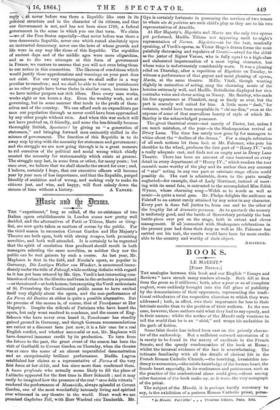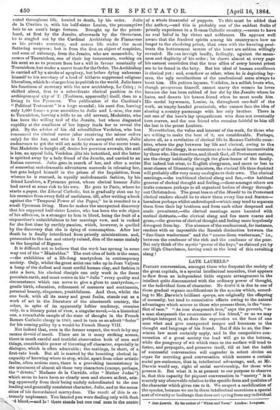BOOKS.
LE MAI:MIT.*
[FIRST NOTICE.]
THE analogies between this book and our English " Essays and Reviews " have struck many readers already. Both fell at first from the press as if stillborn ; both, after a year or so of complete neglect, were suddenly brought into the full glare of publicity by the denunciations of their opponents, representing the tradi- tional orthodoxies of the respective churches to which they were addressed ; both, in effect, owe their importance far less to their intrinsic merits than to the position of their authors. In the one case, however, those authors said what they had to say openly, and in their names; whilst the author of the Maudit only ventures to tell the world that he is an "abbe," and wraps his audacities in the garb of fiction.
Some faint doubt has indeed been cast on the priestly charac- ter of the authorship. But a sufficient outward attestation of it is surely to be found in the outcry of cardinals in the French Senate, and the speedy condemnation of the book at Rome ; whilst the internal evidence of the fact is overwhelming. The intimate familiarity with all the details of clerical life in the French Roman Catholic Church,—the besetting, irresistible ten- dency to sermonize,—the subtle knowledge of the human heart, the female heart especially, in its weaknesses and pettinesses, such as the practice of the confessional alone could give,—these among other features of the book make up, as it were, the very autograph of the priest.
The subject of the Matta, it is perhaps hardly necessary to say, is the exhibition of a pattern Roman Catholic priest, pass- • La Maudit. Par l'Abb6' . . . Troisiaine Edition. Pula. 1564.
cuted throughout life, bunted to death, by his order. Julio de la Clavier() is, with his half-sister Louise, the presumptive heir to an aunt's large fortune. Brought up for the priest- hood, at first by the Jesuits, afterwards by the Oratorians, he is singled out by the Cardinal Archbishop de Flamarens as his private secretary, and enters life under the most flattering auspices ; but is from the first an object of suspicion, and soon of calumny, from the Jesuits, who are meanwhile, by means of Tournichon, one of their lay instruments, working on his aunt so as to procure from her a will in favour nominally of Totunichon, but under a secret trust for the Order. The Archbishop is carried oft' by a stroke of apoplexy, but before dying unbosoms himself to his secretary of a load of hitherto suppressed religions liberalism, which he charges him to publish to the world. Julio loses his functions of secretary with the new archbishop, Le Cricq ; is shifted about, first to a subordinate clerical position in the archiepiscopal city of T. (Toulouse, apparently) itself, then to a living in the Pyrenees. The publication of the Cardinal's "Political Testament" is a huge scandal; his aunt dies, leaving only 1,000 francs a year annuities to Julio and Lluise, the rest to Tournichon, barring a trifle to an old servant, Madelette, who has been the willing tool of the Jesuits, but whose disgusted cupidity at the smallness of her legacy leads her to reveal the
plot. By the advice of his old schoolfellow Verdelon, who has renounced the clerical career (after receiving the minor orders only) for the bar, and who is Louise's accepted suitor, Julio endeavours to get the will set aside by reason of the secret trust. But Madelette is bought off, denies her previous avowals, the suit is lost, an appeal fails, Verdelon jilts his betrothed, and the latter is spirited away by a lady friend of the Jesuits, and carried to an Italian convent. Julio goes in search of her, and after a series of somewhat melodramatic adventures succeeds in releasing her, but gets lodged himself in the prison of the Inquisition, from whence he is rescued, in equally melodramatic fashion, by his friend Lotibere, a Pyrenean priest, whose clerical honour Julio had saved at some risk to his own. He goes to Paris, where he starts a paper, the Liberal Catholic, but is gradually shut out by his enemies from every field of usefulness, till, after writing a book against the "Temporal Power of the Popes," he is remitted to a small Pyrenean living. Here he makes the unexpected discovery that his supposed half-sister Louise, who has been the sole object of his affection, is a stranger to him in blood, being the fruit of a stepmother's unfaithfulness to her marriage vow, and is racked for the first time by earthly passion, which, however, is quelled by the discovery that she is dying of consumption. After her death he is finally interdicted from priestly ministrations, and, persecuted to the last and utterly ruined, dies of the same malady in the hospital of Bigorre.
It is difficult not to believe that the work has sprung in some way out of the " Miserables." The root-idea of both is the same, —the exhibition of a life-long martyrdom in contemporary society. Only, whilst the great artist can take up in Jean Valjean a lump of the dullest and most sordid human clay, and fashion it into a hero, his clerical disciple can only work in the finest porcelain earth, and must centre in his " Julio " every quality and circumstance which can serve to give a gloss to martyrdom,— gentle birth, education, refinement of manners and sentiments, personal beauty, eloquence, youthfulness. And thus, whilst the one book, with all its many and great faults, stands out as a work of art in the literature of the nineteenth century, the other, in spite of its apparently loftier tendency, remains only, in a literary point of view, a singular novel,—in a historical one, a remarkable sample of the state of thought in the French Roman Catholic clergy in 1803, used in turn as an adroit "feeler" for his coming policy by a would-be French Henry VIII.
Not indeed that, even in the former respect, the work is by any means devoid of merit. There are in it many striking scenes, there is much careful and truthful observation both of men and things, considerable power of throwing off character, especially in dialogue, which is often admirable ; the makings, in short, of a first-rate book. But all is marred by the besetting clerical in- capacity of knowing where to stop, whilst, apart from other artistic faults, often serious ones, there is a provoking inconsistency in the treatment of almost all those very characters (except, perhaps, the " devote," Madame de in Caned°, alias " Mother Judas") which seem to have been so clearly seen and shown at first, aris- ing apparently from their being unduly subordinated to the one leading and generally consistent character, Julio, and to the neces- sities of his foreordained martrydom. The result of this is ex- tremely unpleasant. You fancied you were dealing only with flesh 'd blood,—and lo ! there stands but one real man in the centre
of a whole theatreful of puppets. To this must be added that the author,—and this is probably one of the saddest fruits of
priestly experience in a Roman Catholic country,—seems to have no real belief in lay virtue and nobleness. He appears well aware that the frankest spirits among his countrymen bow no longer to the absolving priest, that even with the kneeling peni- tents the bottommost secrets of the heart are seldom willingly
revealed. He can inveigh loudly, feelingly, against the mean- ness and duplicity of his order ; he shows almost at every page his earnest conviction that the true allies of every honest priest are to be found in the laity. But his ideal of human excellence is clerical yet ; and, somehow or other, when he is depicting lay- men, the ugly recollections of the confessional seem always to beset him. His pattern layman, Verdelon, is a selfish brute who, though prosperous himself, cannot marry the women he loves
because she has been robbed of her dot by the Jesuits whom he hates, and deserts his bosom friend when he most needs him. His model laywomen, Louise, is, throughout one-half of the work, an 'empty-headed provincials, who cannot face the idea of sharing a country parsonage with her only brother. There is not one of the hero's lay sympathizers who does not eventually turn craven, and the one friend who remains faithful to him till the last is the priest Loubere.
Nevertheless, the value and interest of the work, for those who are willing to make the best of it, are considerable. Perhaps, above all, as a revelation of clerical life in Roman Catholic coun- tries, where the gap between lay life and clerical, owing to the celibacy of the clergy, is so enormous as to be almost inconceivable by those who, like ourselves, and,thank God, all Protestant nations, see the clergy habitually through the glass-house of the family.
Not indeed but what, to English clergymen, and more or less to most classes of Dissenting ministers, the clerical life thus depicted will probably offer very many analogies to their own. The clerical meetings,—the traditional clerical slang and fun,—the habitual grooves of clerical thought and feeling,—these amongst others are
traits common perhaps to all organized bodies of clergy through- out Christendom. The great lesson of the Maudit to its Protestant clerical readers should be to show them every line and feature— harmless perhaps whilst undeveloped—which may tend to separate them from their lay brethren and from each other deepened and made prominent,—the clerical meetings more haunted with mutual distrusts,—the clerical slang and fun more coarse and gross,—the grooves of clerical thought and feeling more hopelessly divergent from lay. The absence of the confessional, for instance, renders with us impossible the Romish distinction between the "fine-linen washerman" and the "coarse-linen washerman," i.e., between the confessor of the rich and the confessor of the poor. But only think of the mystic "power of the keys," as claimed yet by our High Churchmen, having stink to the level of this revolting slang !































 Previous page
Previous page